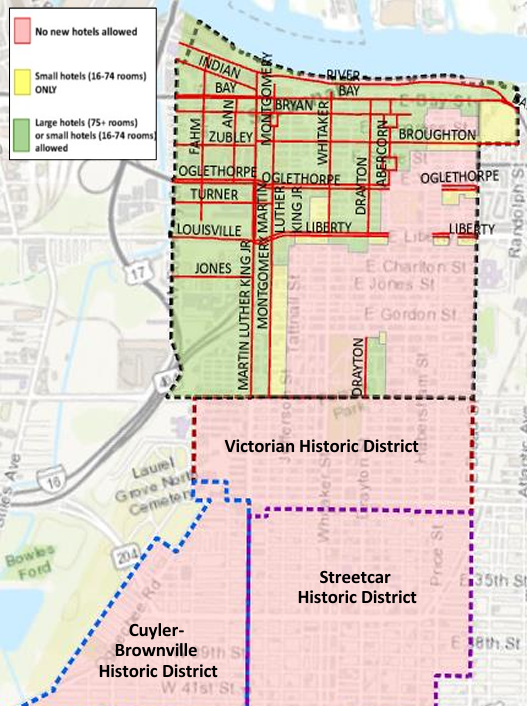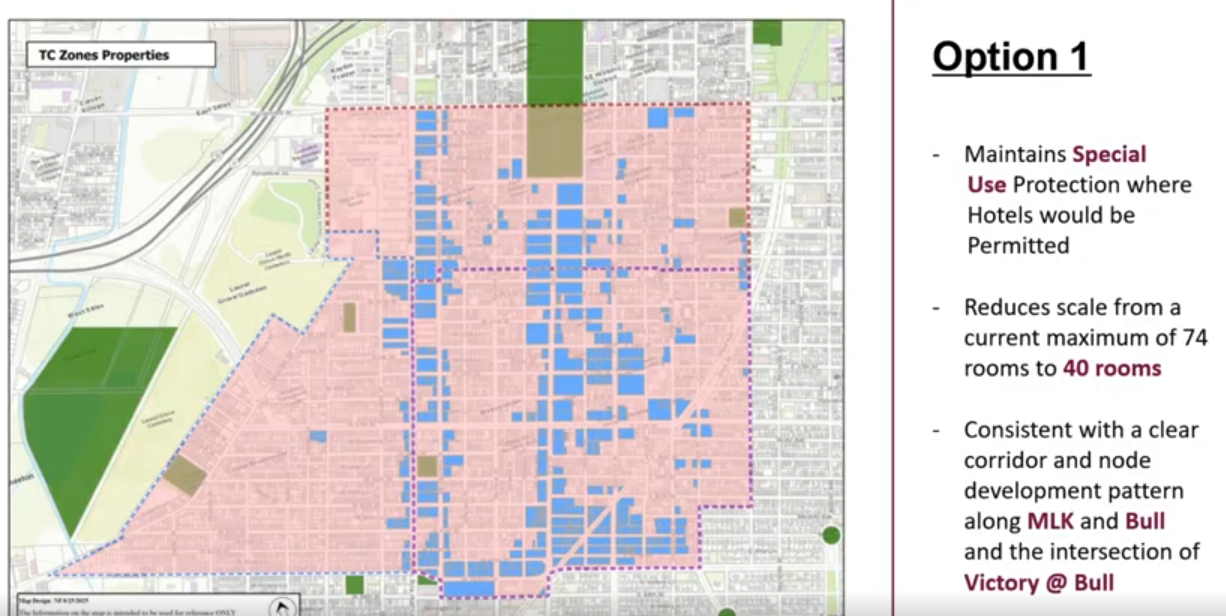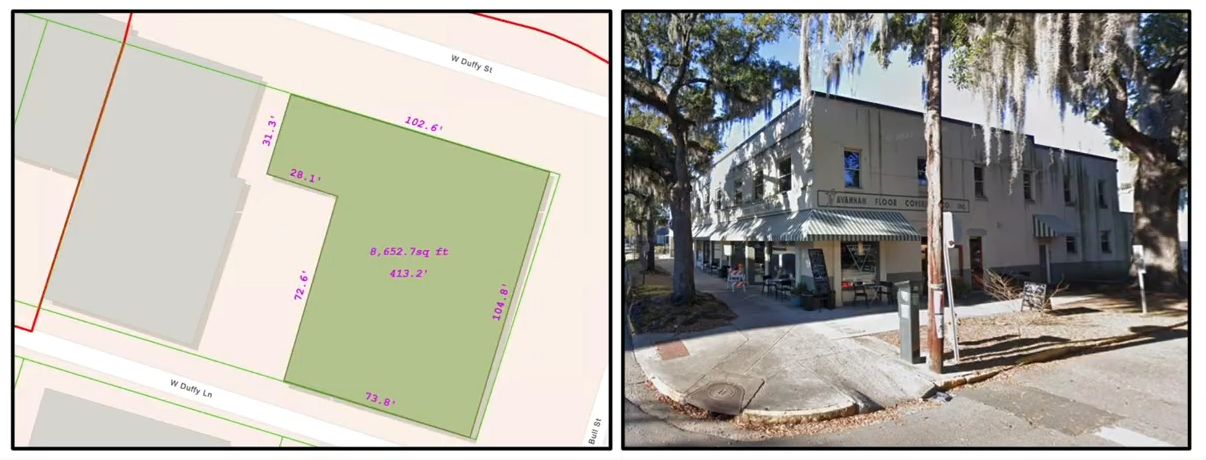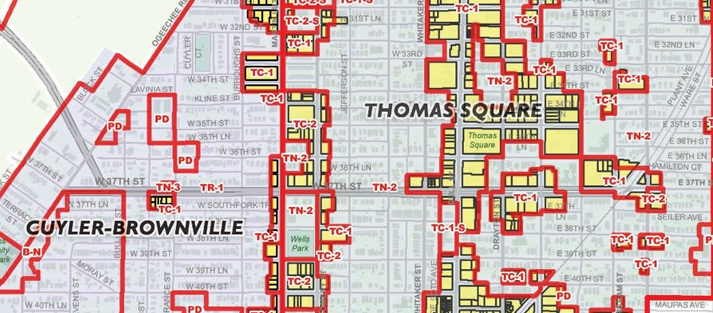MOST of you have heard the news by now: An extensive ban on new hotel development, initiated by local citizens, was passed by the Metropolitan Planning Commission (MPC) last week for three historic neighborhoods in Savannah’s mid-city.
While that unusual successful rebuke to out-of-scale development was celebrated by most everyone (full disclosure: including myself), despite the welcome outcome the controversy summed up almost everything that’s broken about the MPC-driven planning process in Savannah and Chatham County.
The extension of this strict Hotel Development Overlay (HDO) beyond the landmark Historic District was a purely citizen-driven initiative. If approved by Savannah City Council, will now apply to the Victorian Neighborhood, the Thomas Square neighborhood, and Cuyler-Brownville, in a major triumph for grassroots politics.
In simple terms, it would essentially ban any new hotel construction larger than the small-inn status of 15 rooms, in most parts of Savannah north of Victory Drive.

But the road to getting to that extension was fraught with many red flags and much hard-earned wisdom.
I’ll go over the major takeaways here:
It’s OK to Push Back Against MPC Staff Recommendations
For those unfamiliar with how the Metropolitan Planning Commission works, they have a dedicated professional staff of full-time urban planners and experts who do pretty much all the research and legwork prior to votes by the all-volunteer Commissioners themselves.
Part of this legwork involves providing a highlighted MPC Staff Recommendation, always an important part of any MPC agenda – usually, and in my opinion unfortunately, the most important part.
The vast majority of times the MPC commissioners rely on the staff recommendation and vote accordingly. I myself have referred to the MPC as a rubber-stamp body, which I admit is a bit hyperbolic but is true more often than not.
A staple part of many MPC meetings is someone defending the chivalry and personal honor of the MPC staff whenever anyone raises an issue with one of their conclusions – even a legitimate and important issue that involves the very reason there is an MPC.
It's difficult personally for even the most neutral and well-intentioned MPC commissioner to vote against the staff recommendation, especially in a city like Savannah where so much rides on personal social capital and acceptance. There is enormous peer pressure.
Add in the possibility of an MPC commissioner who isn’t neutral and who might in fact be compromised… and well, you see how difficult it can get. (More on that later.)

In the case of the proposed Hotel Development Overlay District changes, not only did MPC staff provide a recommendation against banning hotels – it threw in a few wrinkles of its own that seemingly would expand developer’s rights beyond what is currently available.
The staff recommendation called to make significant changes involving areas of the city that had nothing to do with the proposed Hotel Development Overlay extension, and whose residents have had zero time to be aware of the proposed changes or to respond to them.
Specifically, MPC staff wanted to extend the status of the so-called “bonus story,” in other words an extra story over and above what’s allowed in the current height map. They also sought to extend the practice of granting “special use permits” for out-of-scale buildings.
These recommendations were met with something approaching disbelief by many of the public speakers on hand at last Tuesday’s meeting.
“I’m very concerned about modifications [to the proposal] which appear to apply to all historic districts. Initially this topic was supposed to be about districts other than downtown,” said attorney and preservation advocate Andrew Jones, a frequent commenter at MPC meetings.
“We found out basically two days ago about this. This is the first time we are hearing about these modifications and how they could apply across downtown,” Jone said, accusing MPC staff of “coming in through the back door” to insert new provisions.
“The bonus floor affects more than just use – it affects the physical appearance and historic integrity of the district. This is changing historic district preservation rules through an MPC modification at the last moment.”
In a gutsy move for an organization which has become noticeably softer on development over the past decade or so, brand-new Historic Savannah Foundation Executive Director Collier Neeley chose one of his first public appearances in Savannah to speak out against the MPC recommendation:
“This would seem to extend the bonus stories into the Historic District,” he said. Additionally, staff’s recommendation for extending the applicability of special use permits to allow hotels 40 rooms and under “erodes the intention of the Hotel Development Overlay.”
“Reducing historic residential neighborhoods to hotel districts threatens their character and fundamentally changes how we use our built environment,” Neeley concluded.
Victorian Neighborhood Association President Nancy Maia, who in my view was the most persuasive public speaker at the meeting, had this to say about staff’s recommendations:
“A special use permit requires the neighborhood to be ever-vigilant. Getting notice two weeks in advance of a hearing is the only way to stay aware and be able to react,” Maia said.
Paul Cobet is the current president of the Downtown Neighborhood Association. He summed up most of the objections to the MPC’s last-minute push:
“We’re opposed to the MPC staff recommendation to adopt an option that would apply to all historic districts,” he said. “The bonus story is a pass to violate the height map, and encourages overbuilding.”
In my opinion, the MPC staff recommendation should generally carry much less weight. The full MPC should have more responsibility to weigh options as a community voting body.
It’s OK to Push Back Against Conflicts of Interest
Anyone who’s covered or followed the MPC over the decades is accustomed to seeing major players sitting on the commission who at least theoretically have a built-in pro-development bias, such as realtors, architects, and developers themselves.
But occasionally you see a case that is so egregious that it defies even Savannah’s usual loose norms.
One such case involves MPC Commissioner Jeff Notrica, a regional developer with a certain amount of infamy on the public record who often has personal business in front of the MPC.
(Amazingly, Notrica also serves as the chairman of the local Historic Preservation Commission.)

Starkly and almost unbelievably, the very first presentation by MPC staffer Edward Morrow in support of the staff recommendation involved a property owned by Notrica himself.
It’s a parcel on Bull Street that’s currently the home of White Whale Craft Ales and the Neighborhood Comics store, which Notrica is seeking to also adapt to use as an inn.
In a scene right out of a courtroom drama, Thomas Square Neighborhood Association Vice President Jason Combs almost couldn’t believe it when it was his turn to speak, and seized the opportunity.
“This is appalling,” Combs exclaimed. “Edward Morrow has used this as example of a building that would benefit from what they are recommending. The owner of this building is sitting right here on this Commission! And has not recused himself.”
MPC Chairman Travis Coles somewhat tepidly responded that Notrica’s recusal is “his decision to make, if he had a financial interest in this.”
MPC Executive Director Melanie Wilson said, “He can [recuse himself], but he has technically no financial interest” in the decision.
This to most observers would appear to be inaccurate – especially since the MPC staff specifically singled out Notrica’s property to illustrate their own pro-development recommendation.
To be fair, Notrica did indeed recuse himself from the final vote without an argument, likely because of Combs’s forceful pushback to kick off public comment.
But the drama highlighted what is probably the core conflict of the MPC as a body.
It’s OK to Expand the Terms of Debate
More sharp-eyed observers of local politics have noted that local regulatory bodies often subtly encourage development by discouraging certain types of anti-development debate by rule.
This is made worse by the fracture of development oversight into several layers of regulatory bodies, each body with its own area of responsibility but very few who are allowed to consider a project in total.
In the case of many local commissions, such as the Historic District Review Board (HDBR) and less so the MPC itself, commissioners are specifically not allowed to fully debate what the use of a proposed new development will be.
For example, the HDBR can only critique height and mass of a proposal, and building materials to a certain extent. That’s it.
The proposed use of a building is considered completely off-limits for them to even bring up.
Meanwhile, developers and pro-development interests have no such prohibitions on speech.
Several speakers at last week’s MPC meeting pointed this out, including David McDonald, former president of the Downtown Neighborhood Association:
“One of the benefits that a Hotel Development Overlay provides is residents have the opportunity to argue against a hotel specifically,” stated McDonald. Otherwise, he said “We are not allowed to bring up end use – all we can argue and articulate against is height and mass.”
Nancy Maia of the Victorian neighborhood echoed this:
“Implementing the HDO takes the burden of proof off of the residents -- who are asked to provide evidence why a project should not be approved -- and puts it on the developer, who would need to provide evidence as to why it should be approved.”
Use Specific Examples
Countless members of the public have fought development proposals using similar (and correct) arguments about the need to preserve Savannah’s unique historic properties as essential to the community’s character.
Sometimes these arguments work, often they don’t. But the most effective arguments use specific examples to make the stakes more clear.
For example, in last week’s MPC meeting, Victorian Neighborhood Association Nancy Maia made what I believe was the most effective presentation, thusly:
Without mentioning Commissioner Notrica by name, she referred to another project of his that has been in front of the MPC: two lots across from the old Sears building at Drayton and Henry.
Saying that the two lots have already been “combined and rezoned to be hotel-ready,” Maia pointed out that “These lots went from being worth $200,000 prior to rezoning, to being put on the market for just under $6 million a few days after.”
Further describing the impact of unrestrained development in specific terms, she said:
“It isn’t hard to imagine the Sentient Bean becomes a Starbucks. Local 11 10 becomes a chain restaurant. White Whale? A Wet Willies. The comics shop? A T-shirt shop,” she said.
Local resident Jonathan Morgan said:
The last thing we need is more hotels. When hotels are doing good we have a lot of parking problems,” he said. “When hotels are doing bad, everyone who works for that hotel, they don’t have work, and we have a big empty building.”
Resident Lane Huerta used specifics from her own life, along with a pointed reference to Commissioner Notrica.
“I have to walk two blocks to reach my home with groceries,” Huerta said, referring to the already-congested nature of parking in the area.
She pointed out the lack of infrastructure currently, such as recurrent flooding and still no crosswalks for pedestrians.
At one point, frustrated with Notrica, she said: “Mr. Notrica, is there any way you can not be on your cellphone while I’m speaking, please? I reclaim my time until he’s done… I’m sorry, but I’ve spent 3 hours sitting here waiting my turn, and I would appreciate your time as well.”
The Main Thing: Organize, Organize, Organize
There is quite simply no way this grassroots victory would have been won without extensive public reaction and vocal support – in person, not just online.
The involvement of so many neighborhood association leaders is obviously important. But, as we’ve seen in some local cases, association leadership may or may not be fully representative of what the community wants.
But there can be no doubt about what the community wants when the community shows up in force, in person, at public meetings, and makes it clear they’re not going to take any more of anyone’s bullshit.
And key to this process is taking the initiative. This new Overlay extension was a project initiated by neighborhood leaders and residents, who approached the City about it – rather than the other way around.
The powers arrayed against taxpaying full-time residents in Savannah are daunting: Pro-development money that essentially buys local politics… an emphasis on tourism interests and the tourist district above all other areas of town… short-term vacation rentals taking over entire neighborhoods… and a certain very influential local institution of higher education that goes by a four-letter acronym, to name just a few.
But every now and then, the regular folks win a fight. And it can not only be exhilarating, but a lesson to others as to how to do it.
Jonathan Morgan put it best last week:
“I’m impressed by who we have here. I can’t find anything like this anywhere else. We have something special.”
The vote passed 6-2, with Tom Woiwode and Stephen Plunk as the no votes. Jeff Notrica recused himself.

